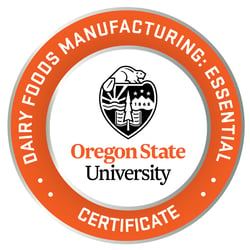✓ 100% online around your schedule
✓ Open enrollment with no prerequisites
✓ Designed to give you in-demand career skills
25 hours
(approximately 2 hours per module)
Anytime | Available On-Demand
$900 / $600 for OR, WA, CA residents

The Essential Dairy Foods Manufacturing Certificate will give you the needed skills and expertise that companies require.
Understanding the fundamentals of ‘why’ and ‘how’ dairy products are manufactured will give you a competitive advantage and allow you to communicate confidently. For instance, knowing all about food safety, or the fundamentals of cleaning and sanitation, or even regulatory requirements will open up doors of opportunities.
Whether your focus is on operations, manufacturing, quality, safety or supply chain, this certificate will give you a deeper understanding of the essential aspects and an appreciation of the big picture and how these pieces all work together.
By the end of the program, you will be able to:


MODULE 1: Intro to Dairy Production and Processing Industry
Module 1 is intended to be an overview of our U.S. dairy industry from farm to table, and to give context to where the dairy processing sector fits in the total dairy supply chain.
MODULE 2: Dairy Chemistry and Physics
Module 2 is important to understand the principles and aims of cleaning and sanitation in the production of dairy products.
MODULE 3: Dairy Microbiology
Module 3 is intended to be an overview of fundamentals of dairy microbiology – including microorganisms (bacteria, fungi, viruses) and microbial growth factors and characteristics.
MODULE 4: Fluid Milk I
In module 4, we will be looking at the unit operations involved in fluid milk processing and dairy products manufacture.
MODULE 5: Fluid Milk II
In module 5, we will be looking at higher heat, thermal operations that go beyond normal pasteurization conditions and are used in processing of fluid milk and other liquid dairy products.
MODULE 6: Common Dairy Equipment
In module 6, we will be looking at the equipment used in dairy processing.
MODULE 7: Packaging
In module 7, we will be looking at the basics of food packaging with special focus on dairy products.
MODULE 8: Current Good Manufacturing Practices
Module 8 is focused on good manufacturing practices we employ every day in our processing plants.
MODULE 9: Cleaning and Sanitation
In module 9, we will be looking at the importance and challenges of cleaning and sanitation of equipment and processes in dairy manufacturing.
MODULE 10: Food Safety Systems and Culture
In module 10, we will look at food safety systems through background, history and definitions.
MODULE 11: Regulations and Standards for Dairy
In module 11, we will look at the regulatory environment for the dairy industry.
MODULE 12: Sustainable Dairy Processing
Module 12 focuses on definitions related to environmental sustainability (e.g., carbon foot print, greenhouse gases, Life Cycle Assessment) and sustainable dairy processing, current status of dairies, impact of dairy on the emissions as well as opportunities to reduce the emissions.
MODULE 13: Membrane Filtration Process
In module 13, we will look at the membrane separation and concentration technologies.
MODULE 14: Concentration, Evaporation, Drying
In module 14, we will be looking at concentration, evaporation, drying technologies.
MODULE 15: Supply Chain Management for Non-Dairy Ingredients
In module 15, we will look at a broad array of non-dairy ingredients that, when added to milk, help us make delicious and safe dairy products like yogurt, ice cream, cheese and more!
MODULE 16: Quality Systems and Finished Product Quality
In module 16, we will look at a Quality System including sampling, testing, and inspection of our ingredients, in-process products, and finished products.
MODULE 17: Basic Cheese Making
In module 17, we will look at the definition of cheese, classification cheese, cheese production, utilization of cheese whey as well as the quality and safety aspects in cheese.
MODULE 18: Specialty Cheese Making
Module 18 focuses on the broad categories of specialty cheeses.
MODULE 19: Grade A Cultured Dairy Products
In module 19, we will look at the manufacturing of Grade A cultured dairy products.
MODULE 20: Dried Dairy Products I (Milk and Whey Powders)
In module 20, we will look at the two dried products categories: milk powder and whey powder.
MODULE 21: Dried Dairy Products II (WPC, WPI, Lactoferrin, Casein)
In module 21, we will be looking at the further dried product categories: powders of whey protein concentrate, whey protein isolate, lactoferrin, and casein.
MODULE 22: Ice Cream
In module 22, we will look at the definition and types of ice cream, the manufacture of ice cream, and its structure.
MODULE 23: Cream and Butter
In module 23, we will be looking at the definition of cream and butter as well as the standards for these products.

“As one of the nation’s largest dairy producers, we have an ongoing need for a skilled workforce with core knowledge of dairy science, manufacturing, and products. That’s why we’re excited to support the new Dairy Manufacturing Online PACE program at Oregon State. This program will help people in dairy – and those interested in the sector – to develop the skills and knowledge they need to help ensure the success of co-ops like ours for years to come.” ~ Greg Chandler - Darigold

We offer short ("micro") certificates for the following specialty areas. These may be completed independently or in conjunction with an Essential or Advanced Certificate program.
Qualified Individual Micro Certificate. Modules 8 & 10. GMPs and Food Safety Systems and Culture. These modules are needed by all plant personnel and can be repeated annually to meet FSMA refresher training requirements for Food Hygiene and Food Safety. Intended audience for this track includes new hires and annual refresher training for all plant workers.

